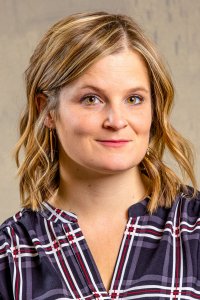Writing Mothertrucker Through a Series of Twists
 Amy Butcher, an award-winning essayist and author and director of OWU’s creative writing program, says the process for writing Mothertrucker mirrored the advice she gives to her students.
Amy Butcher, an award-winning essayist and author and director of OWU’s creative writing program, says the process for writing Mothertrucker mirrored the advice she gives to her students.
“Like most projects, it began as one thing—a profile of an extraordinary woman—and evolved into something altogether different upon research and experience,” she says.
“I talk to my students a lot about how the creative essay intentionally begins from a place of questioning or curiosity. Philip Lopate argues we must begin essays from a place of doubt or not knowing, which runs counter to the academic essay we all know and write in high school. Vivian Gornick argues it must ‘take the reader on a journey’ and ‘bring us into a clearing where the sense of things is greater than it was before.’
“That doesn’t mean, I tell my students, that everything is resolved and you have the answer suddenly to everything that confounded you. It means you’ve added to the conversation, or gained some clarity, or perhaps have a renewed focus on the question you were originally setting out to answer for yourself or others. In fact, even the term ‘essay,’ which most in the literary community prefer over ‘creative nonfiction,’ originates from the French term essayer, or to attempt, to try. The genre truly comes from a place of experimentation and working towards a point of clarity.
“This book is an essay around what it means to be a woman in America, what it means to be ‘strong’ and operating in a patriarchal world and nation, as much as it is an exploration of a subject, Joy ‘Mothertrucker’ Wiebe.
“It goes without saying, then, that the project took me in a direction I never expected but should have: a frank conversation about the prevalence of intimate partner violence and the way it dominates and shapes the lives of so many. For my part, I want this book to be seen as a work of advocacy surrounding visibility—not only of the myriad ways in which one can abuse another person (physically , of course, but also psychologically, verbally, emotionally, and financially), but also in the way millions of women and trans and non-binary individuals suffer primarily in silence in this country, because while the abuse against their body matters, they understand we still operate in a society that so commonly insists that it doesn’t.”
Butcher says she’s especially grateful to Kathy Boles Smith ’71 and Alton Smith for their campaign gift supporting their endowment for faculty leave, which provided her with leave to finish the book.
